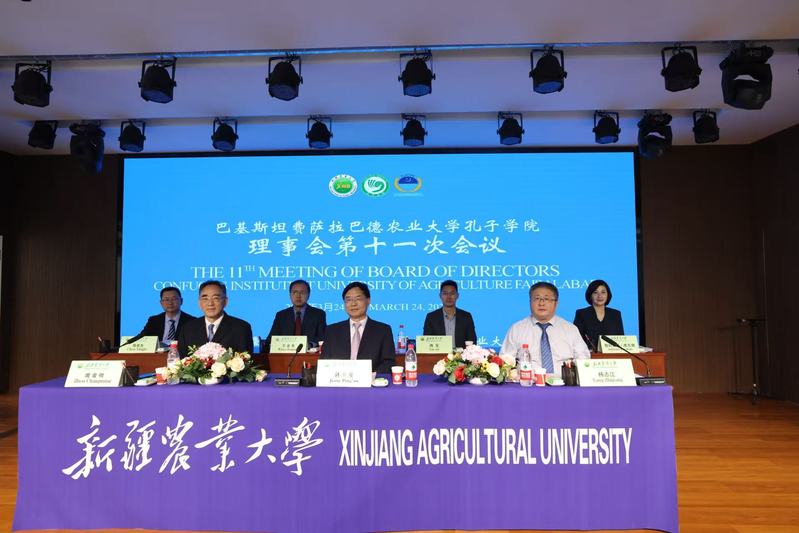Recently, Confucius Institute at the University of Agriculture, Faisalabad (CI-UAF), jointly established by Xinjiang Agricultural University (XJAU) and Pakistan's University of Agriculture Faisalabad (UAF), held its 11th Board of Directors meeting. The online session was chaired by Prof. Dr. Yang Zhijiang, deputy Chinese chair of the Board of Directors and director of the Division of International Exchange and Cooperation, XJAU.
A total of 12 board members from both institutions attended the meeting. Key participants included Chinese chair of the Board of Directors Prof. Dr. Jiang Ping'an, President, XJAU, and Pakistani chair Prof. Dr. Zulfiqar Ali, Vice Chancellor, UAF.
At the beginning of the meeting, President Jiang Ping'an stated that over the 11 years since the establishment of CI-UAF, the two universities had leveraged the joint construction of the Institute to spark multifaceted agricultural technology collaboration through Chinese language education, fostering international exchanges and friendship between XJAU and multiple Pakistani institutions, particularly UAF. He emphasized that XJAU would continue its unwavering support for CI-UAF's development. Looking ahead to 2025, Jiang expressed hopes for strengthened cooperation in international Chinese language education to advance the high-quality growth of the Confucius Institute. He proposed deepening agricultural academic partnerships through the Institute’s platform, jointly cultivating high-level talents needed for the China-Pakistan Economic Corridor (CPEC), and promoting mutual understanding between youth from both universities. These efforts, he noted, would actively contribute to the further deepening of China-Pakistan ironclad friendship.
Following this, Prof. Dr. Zulfiqar Ali addressed the meeting. He affirmed his commitment to upholding the established legacy of excellence laid by his predecessors. He pledged to propel the sustained development of CI-UAF, highlighting its pivotal role in deepening the China-Pakistan bond. He emphasized that, with joint support and building upon the existing solid foundation, CI-UAF would further expand academic and cultural collaboration. Prof. Zulfiqar Ali stated that UAF would work closely with XJAU to elevate bilateral cooperation to new heights, striving to contribute meaningfully to the vision of a community with a shared future for humanity.
Prof. Dr. Zhou Changming, Chinese Dean of CI-UAF, and Prof. Dr. Zahir Ahmed Zahir, Local Dean, delivered reports on the Institute’s 2024 annual work summary and 2025 work plan, respectively. All attending members reviewed updates on CI-UAF’s Chinese language teaching, cultural activities, signature initiatives, and innovative programs, followed by in-depth discussions that resulted in unified consensus.
As a key platform for people-to-people exchanges under the CPEC, CI-UAF has not only built bridges for linguistic and cultural communication but also pioneered a three-in-one Education-Technology-Humanities model for international collaboration. With the deepening implementation of the Belt and Road Initiative, the two universities will continue exploring innovative pathways for industry-education integration, nurturing interdisciplinary talents with global competence to inject enduring momentum into building the China-Pakistan community with a shared future in the new era.
As emphasized by both university leaders, this tree of language rooted in the fertile soil of China-Pakistan friendship is poised to bear even more abundant fruits of technological innovation and cultural understanding, further solidifying the unbreakable bond between the two nations.
In 2024, marked by three landmark milestones—the inauguration of the Model Confucius Institute’s dedicated facility, the official unveiling of its designation plaque, and the grand celebration of its 10th founding anniversary—CI-UAF has not only achieved transformative growth but also charted a new vision for high-quality international Chinese education through comprehensive upgrades in its educational framework.

